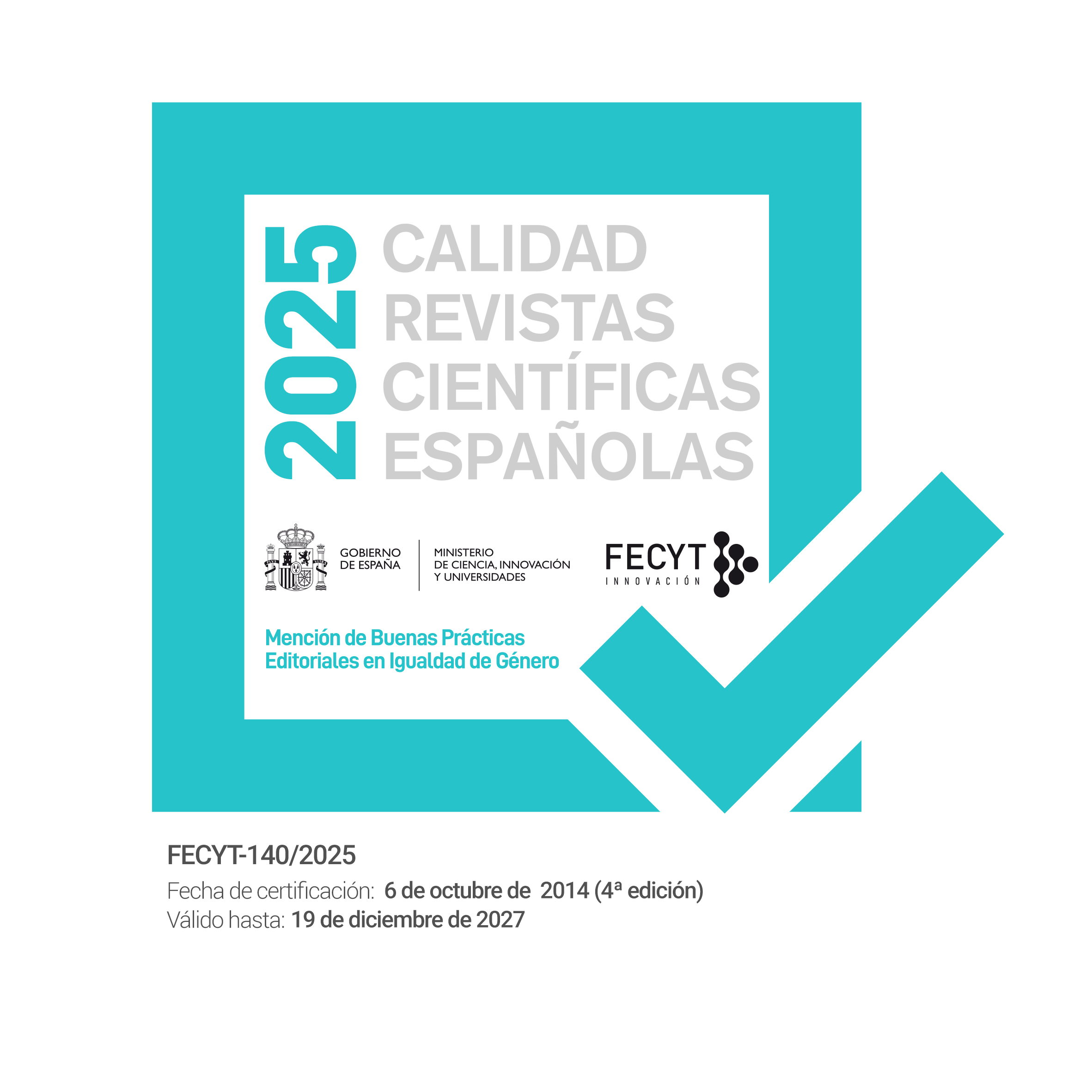The predictive power of social support's sources and types for school engagement
Español
DOI:
https://doi.org/10.5944/educxx1.31876Keywords:
social support groups, learner engagement, teacher guidance, multiple regression analysis, structural equation modelsAbstract
Social support has been found to play a key role in certain adolescent school behaviours and it is widely accepted that it fosters school engagement. On the contrary, more recent theoretical contributions regarding the principal sources and types of social support during adolescence suggest that this relationship may vary. To respond to this gap in the research the aim of the present study is to determine the predictive power of social support for school engagement (behavioural, emotional and cognitive) in accordance with the source (family, friends, and teachers) and type (emotional, material and informational) of the support provided to determine the most influential ones and to test through a structural model the combined statistical effect of both perspectives. Participants were 323 compulsory secondary school students from the Basque Autonomous Community, aged between 13 and 18 years (M = 14.41, SD = 1.18), being 40% boys and 60% girls. Participants completed two questionnaires, one measuring perceived social support and one measuring school engagement. The results of the present study show that perceived support from all sources and all types of support predict at least one of the three dimensions of school engagement. The results also indicate that support from teachers and emotional support were the source and type of support (respectively) that most strongly predicted school engagement, whose combined effect has been tested using SEM methodology. These findings may be particularly useful for designing future educational intervention programmes that seek to foster school engagement through social support. For example, intervention designs focusing on encouraging certain changes in teachers’ practice to foster a learning experience based on closer relations characterised by trust and recognition are suggested.
Downloads
References
Benito, H., Llop, E., Verdaguer, M., Comas, J., Lleonart, A., Orts, M., Amadó, A., & Rostan, C. (2021). Multidimensional research on university engagement using a mixed method approach. Educación XX1, 24(2), 65-96. https://doi.org/10.5944/educXX1.28561
Buzzai, C., Filippello, P., Costa, S., Amato, V., & Sorrenti, L. (2021). Problematic internet use and academic achievement: A focus on interpersonal behaviours and academic engagement. Social Psychology of Education, 24(1), 95-118. https://doi.org/10.1007/s11218-020-09601-y
Caplan, G. (1974). Support systems and community mental health: Lectures on concept development. Behavioral Publications.
Cassel, J. C. (1974a). Psychiatric epidemiology. En G. Caplan (Ed.), American handbook of psychiatry (pp. 401-410). Basic Books.
Cassel, J. C. (1974b). Psychosocial process and “stress”: Theoretical formulations. International Journal of Health Services, 4(3), 471-482. https://doi.org/10.2190/WF7X-Y1L0-BFKH-9QU2
Cheng, S., Deng, M., & Yang, Y. (2020). Social support and student engagement among deaf or hard-of-hearing students. Communication Disorders Quarterly, (1), 1-8. https://doi.org/10.1177/1525740120950638
Cobb, S. (1976). Social support as a moderator of life stress. Psychosomatic Medicine, (5), 300-314. https://doi.org/10.1097/00006842-197609000-00003
Cohen, J. (1988). Statistical Power Analysis for the Behavioral Sciences. Lawrence Erlbaum Associates.
Cooper, K. S. (2014). Eliciting engagement in the high school classroom. American Educational Research Journal, 51(2), 363- 402. https://doi.org/10.3102/0002831213507973
da Silva, L. B., de Souza-Feitosa, M. Z., Nepomuceno, B. B., Silva, A. M. S., Ximenes, V. M., & Bomfim, Z. Á. C. (2019). Social support as a way of coping with poverty. En V. Ximenes, Jr. J. Moura, E. Cidade & B. Nepomuceno (Eds.), Psychosocial Implications of Poverty (pp. 123-135). Springer. https://doi.org/10.1007/978-3-030-24292-3_9
Diao P. (2019). Conceptualizing and measuring the sense of social support. En Y. Yang (Ed.), Social Mentality in Contemporary China. Research series on the Chinese Cream and China’s Development Path (pp. 153-164). Springer. https://doi.org/10.1007/978-981-13-7812-6_10
Dueñas, J. M., Morales-Vives, F., Camarero-Figuerola, M., & Tierno-García, J. M. (2020). Spanish adaptation of the Family Involvement Questionnaire - High School: Version for parents. Psicología Educativa, 28(1), 31-38. https://doi.org/10.5093/psed2020a21
Estell, D. B., & Perdue, N. H. (2013). Social support and behavioral and affective school engagement: The effects of peers, parents, and teachers. Psychology in the Schools, 50(4), 325-339. https://doi.org/10.1002/pits.21681
Fajardo, B. F., Maestre, C. M., Felipe, C. E., León del Barco, B., & Polo del Río, M. I. (2017). Análisis del rendimiento académico de los alumnos de educación secundaria obligatoria según las variables familiares. Educación XX1, 20(1), 209-232. https://doi.org/10.5944/educXX1.17509
Fernández-Lasarte, O., Goñi, E., Camino, I., & Ramos-Díaz, E. (2019). Apoyo social percibido e implicación escolar del alumnado de educación secundaria. Revista Española de Pedagogía, 77(272), 123-141. https://doi.org/10.22550/REP77-1-2019-06
Fredricks, J. A., Blumenfeld, P. C., & Paris, A. H. (2004). School engagement: Potential of the concept, state of the evidence. Review of Educational Research, 74(1), 59-109. https://doi.org/10.3102/00346543074001059
Furrer, C., & Skinner, C. (2003). Sense of relatedness as a factor in children’s academic engagement and performance. Journal of Educational Psychology, 95(1), 148-162. https://doi.org/10.1037/0022-0663.95.1.148
González, D., & Mercado, E. (2019). El modelo social como perspectiva de intervención desde el trabajo social en personas con la capacidad modificada. Revista Española de Discapacidad (REDIS), 7(1), 241-249. https://doi.org/10.5569/2340-5104.07.01.12
Guerrero, S., & Melo, O. (2017). Una metodología para el tratamiento de la multicolinealidad a través del escalamiento multidimensional. Ciencia en Desarrollo, 8(2), 9-24. https://doi.org/10.19053/01217488.v8.n2.2017.5239
Hombrados-Mendieta, I., & Castro, M. (2013). Apoyo social, clima social y percepción de conflictos en un contexto educativo intercultural. Anales de Psicología, 29(1), 108-122. https://doi.org/10.6018/analesps.29.1.123311
Izar-de-la-Fuente, I., Rodríguez-Fernández, A., & Escalante, N. (2019). Measure of perceived social support during adolescence (APIK). European Journal of Investigation in Health, Psychology and Education, 9(2), 83-94. https://doi.org/10.30552/ejihpe.v9i2.322
Kline, R. B. (2015). Principles and practice of structural equation modeling (4a ed.). The Guilford Press.
Lester, P. E., Inman, D., & Bishop, L. K. (2014). Handbook of tests and measurement in education and the social sciences. Rowman & Littlefield Publishers.
Lin, N. (1986). Conceptualizing social support. En N. Lin, A. Dean & W. Ensel (Eds.), Social support, life events and depression (pp. 17-30). Academic Press. https://doi.org/10.1016/B978-0-12-450660-2.50008-2
Mirghafourvand, M., Mohammad-Alizadeh-Charandabi, S., Tavananezhad, N., & Karkhaneh, M. (2014). Health-promoting lifestyle and its predictors among Iranian adolescent girls, 2013. International Journal of Adolescent Medicine and Health, 26(4), 495-502. https://doi.org/10.1515/ijamh-2013-0324
Mischel, J., & Kitsantas, A. (2020). Middle school students’ perceptions of school climate, bullying prevalence, and social support and coping. Social Psychology of Education, 23(3), 51-72. https://doi.org/10.1007/s11218-019-09522-5
Morin, A. H. (2020). Teacher support and the social classroom environment as predictors of student loneliness. Social Psychology of Education, 23, 1687-1707. https://doi.org/10.1007/s11218-020-09600-z
Nouwen, W., & Clycq, N. (2019). The role of social support in fostering school engagement in urban schools characterised by high risk of early leaving from education and training. Social Psychology of Education, 22(5), 1215-1238. https://doi.org/10.1007/s11218-019-09521-6
Perdue, N. H., Manzeske, D. P., & Estell, D. B. (2009). Predicting school commitment at grade five: Exploring the role of students’ relationships with peers and teachers from grade three. Psychology in the Schools, 46, 1084-1097.
Pulido-Acosta, F., & Herrera-Clavero, F. (2019). Prediciendo el rendimiento académico infantil a través de la inteligencia emocional. Psicología Educativa, (1), 23-30. https://doi.org/10.5093/psed2018a16
Ramos-Díaz, E. (2015). Resiliencia y ajuste psicosocial en la adolescencia [Tesis doctoral inédita]. Universidad del País Vasco (España).
Ramos-Díaz, E., Rodríguez-Fernández, A., & Revuelta, L. (2016). Validation of the Spanish version of the School Engagement Measure (SEM). Spanish Journal of Psychology, 19(86), 1-9. https://doi.org/10.1017/sjp.2016.94
Romano, L., Angelini, G., Consiglio, P., & Fiorilli, C. (2021). Academic resilience and engagement in high school students: The mediating role of perceived teacher emotional support. European Journal of Investigation in Health, Psychology and Education, 11(2), 334-344. https://doi.org/10.3390/ejihpe11020025
Schaefer, C., Coyne, J., & Lazarus, R. (1981). The health-related functions of social support. Journal of Behavioral Medicine, 4(4), 381-406. https://doi.org/1007/BF00846149
Schmider, E., Ziegler, M., Danay, E., Beyer, L., & Bühner, M. (2010). Is it really robust? Reinvestigating the robustness of ANOVA against violations of the normal distribution assumption. Methodology, 6(4), 147-151. https://doi.org/10.1027/1614-2241/a000016
Siu, O. L., Lo, B. C. Y., Ng, T. K., & Wang, H. (2021). Social support and student outcomes: The mediating roles of psychological capital, study engagement, and problem-focused coping. Current Psychology. Publicación anticipada en línea. https://doi.org/10.1007/s12144-021-01621-x
Strati, A. D., Schmidt, J. A., & Maier, K. S. (2017). Perceived challenge, teacher support, and teacher obstruction as predictors of student engagement. Journal of Educational Psychology, 109(1), 131-147. https://doi.org/10.1037/edu0000108
Tougas, A. M., Jutras, S., & Bigras, M. (2016). Types and influence of social support on school engagement of young survivors of leukemia. The Journal of School Nursing, 32(4), 281-283. https://doi.org/10.1177/1059840516635711
Wigfield, A., Eccles, J. S., Schiefele, U., Roeser, R. W., & Davis-Kean, P. (2006). Development of achievement motivation. En N. Eisenberg, W. Damon & N. Eisenberg (Eds.), Handbook of child psychology: Social, emotional, and personality development (pp. 933-1002). John Wiley & Sons, Inc.
Yang, X. (2021). Exchanging social support in social commerce: The role of peer relations. Computers in Human Behavior, 124, 106911. https://doi.org/10.1016/j.chb.2021.106911

Downloads
Published
How to Cite
Issue
Section
License
Copyright (c) 2022 Iker Izar-de-la-Fuente, Arantza Rodríguez-Fernández, Naiara Escalante, Oihane Fernández-Lasarte

This work is licensed under a Creative Commons Attribution-NonCommercial 4.0 International License.
Educación XX1 is published under a Creative Commons Attribution-NonCommercial 4.0 (CC BY-NC 4.0)










